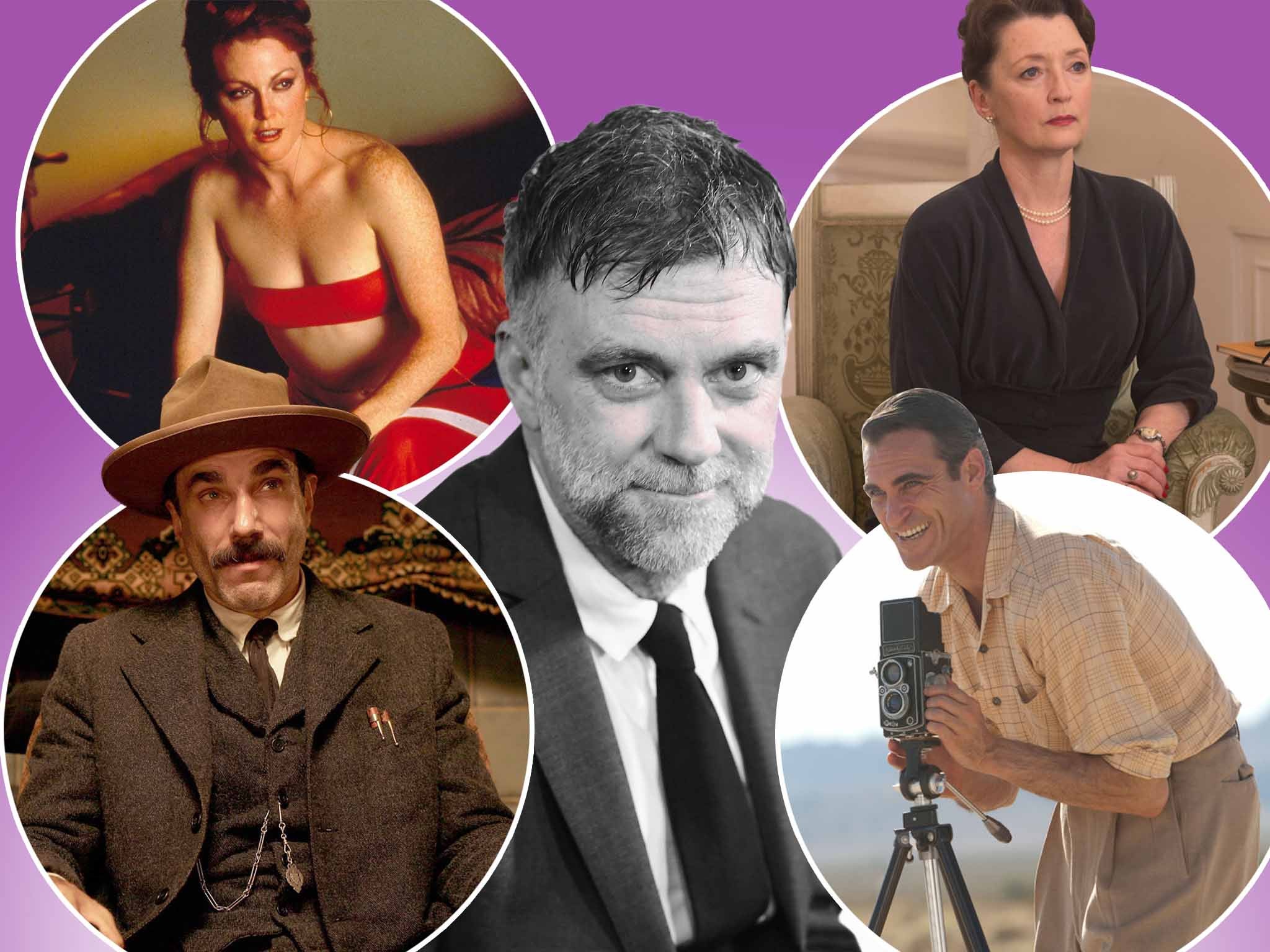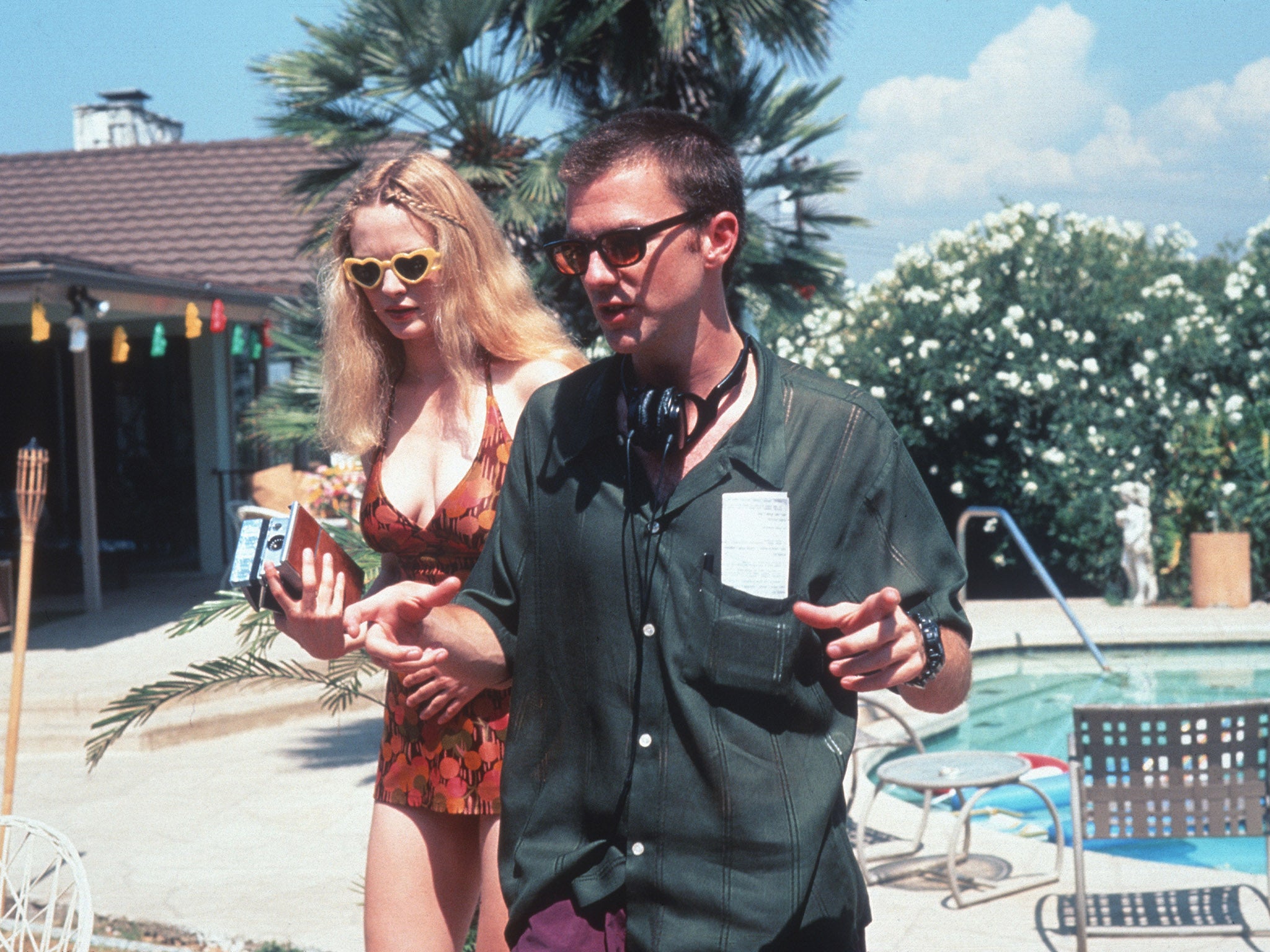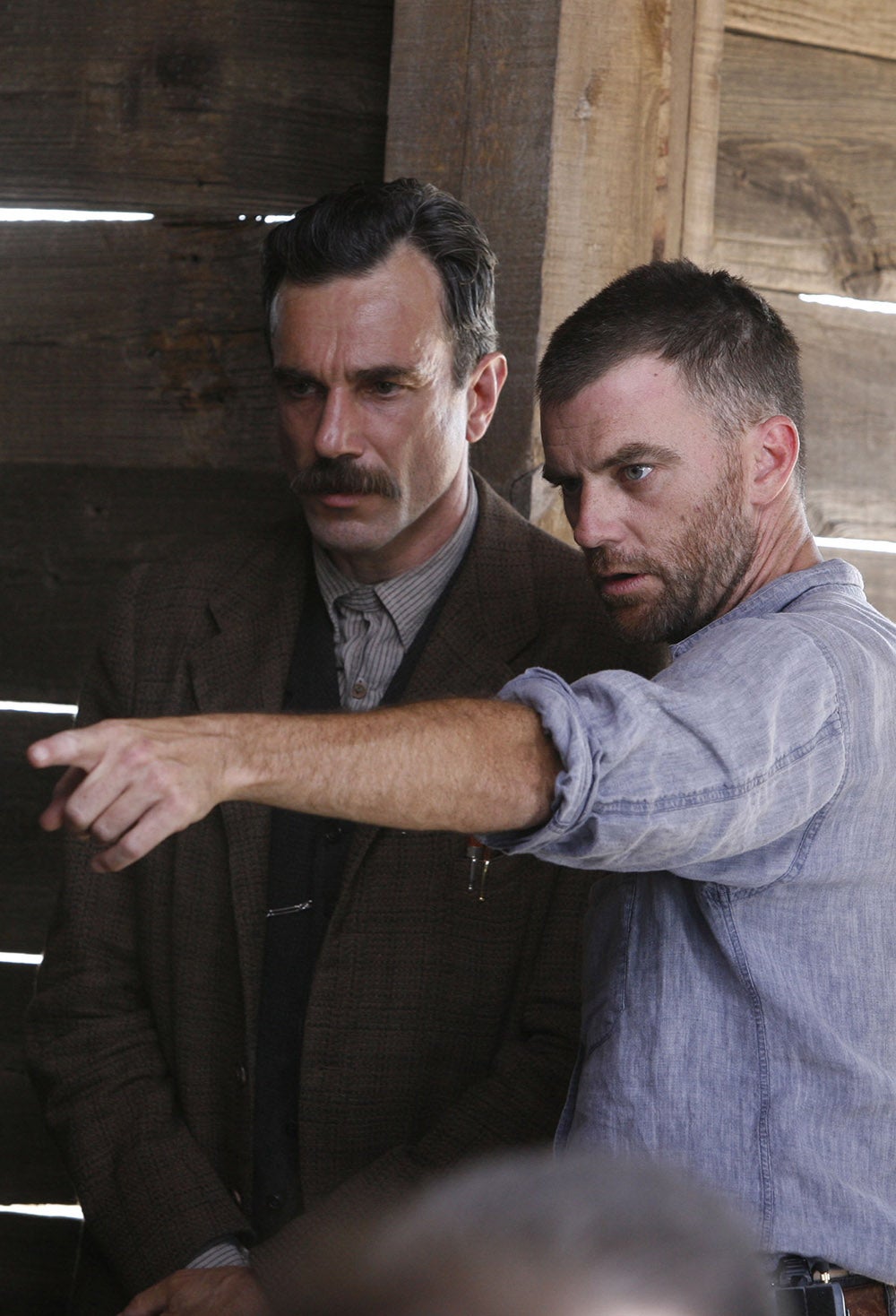‘He’s not the John Huston of his generation, he’s the Tolstoy’: Paul Thomas Anderson, as told by his stars
As the ‘There Will Be Blood’ and ‘Magnolia’ auteur returns with ‘Licorice Pizza’, Julianne Moore, Lesley Manville, Martin Short and some of his closest collaborators tell Sam Moore why the filmmaker continues to inspire such devotion

Ben Affleck has likened him to Orson Welles. Quentin Tarantino called him a “friendly competitor”. Sam Mendes declares him a “true auteur”. But to the people who know him best, Paul Thomas Anderson is a martini-swilling, intensely empathetic jokester, who just happened to make some of the greatest films of the past 25 years. He’s now back with Licorice Pizza, his first in four years, which stars Alana Haim, Cooper Hoffman (son of Philip Seymour) and Bradley Cooper as a walking, talking embodiment of #MeToo.
It’s airier than many of Anderson’s previous films, free-flowing and humorous, relaxing into a vignetted tale of young love and the ache to find one’s place in the world. It’s quintessentially Paul Thomas Anderson, yet a world away from the Shakespearean tragedy of There Will Be Blood or the flamboyant mania of Boogie Nights.
It’s not hard to imagine the director of films such as There Will Be Blood, The Master and Phantom Thread as a brooding obsessive – like so many of his lead characters. Anderson’s films are often a meditation on the fraught state of the American psyche. In There Will Be Blood, turn-of-the-century oil prospector Daniel Plainview (Daniel Day-Lewis) is a solipsist driven by greed and ambition, pushed to the extremes of love and hate through the pursuit of money and power. In The Master, set in the aftermath of the Second World War, America is riven by the scars of conflict, embodied by Joaquin Phoenix’s maniacally sexual military veteran. The swirling three-hour opus that is Magnolia takes place in the dying days of the 20th century, with society fractured, and people isolated, depressed. But Anderson appears not to be burdened with his art in the way so many have been. Anderson, it seems, still possesses a youthful valley boy spirit allied to a self-deprecating sense of humour, which regularly surfaces in interviews and which many of his long-time collaborators say is present on set, too. With Anderson, working relationships often turn into long friendships.
Julianne Moore, whom Anderson directed to her first of five Oscar nominations, in Boogie Nights, recalls the time she met the then 25-year-old for the first time at a party in Los Angeles: “He came up to me and said he’d written a script and I needed to read it,” she says. “He was fantastic and effervescent and alive. I read the script and there was no doubt about whether I wanted to do it. Boogie Nights was all on the page.”
At the time, Anderson had only directed crime drama Hard Eight, which despite starring Samuel L Jackson and Gwyneth Paltrow (and a young John C Reilly as well as frequent Anderson collaborator Philip Baker Hall), had been seen by very few, thanks to a fallout with the producers, who had recut and retitled the film. While Hard Eight later received acclaim after Anderson submitted his original cut to the 1996 Cannes Film Festival, Moore says actors signed on to Boogie Nights solely because of the screenplay, which he had completed in 1995; it was evidence enough of its author’s prodigious talent.
As Moore says of Anderson: “With Paul, I never felt that I was in the hands of somebody who was anything less than an expert. It was pretty evident that he was a major talent, even at 26. It was so obvious on the page how great Boogie Nights was, and then he only superseded what he had written.”
Boogie Nights is a bold piece of virtuoso filmmaking that opens with a four-minute tracking shot, which weaves in and out of a 1970s discotheque. It was not the simplest of productions, however. Juggling intricate shots, a large and fairly inexperienced cast and a difficult working relationship with Burt Reynolds, the young director faced a major task. While Moore recalls the set as “chaotic”, she remembers the shoot with utmost fondness and adored working closely with Reynolds. “Burt came from a different time,” she says, “He was the biggest movie star in the world in the 1970s and here he was in this independent film.” In his autobiography, Reynolds confessed to not having seen the film nor having any inclination to do so, despite it being a career-best performance, landing him a Golden Globe and the type of praise he hadn’t received in decades.

Although Reynolds and Anderson clashed on set, Moore praises the way the director worked with the star of Deliverance and Smokey and the Bandit. “Burt had been a big star and he had a lot of ideas about how he wanted to do things and what was remarkable about Paul was that he gave Burt the space to do what he needed to play the part.” She adds: “I remember one night Burt insisted on shooting something a certain way and it took a lot of time, and it wasn’t something Paul was going to particularly use but he knew it was better to let him have that.”
Anderson has always been an actor’s director. It’s what has led to him working twice with both Daniel Day-Lewis and Joaquin Phoenix, both notoriously selective in their projects. He had 20 years’ worth of collaborations with the late, great Philip Seymour Hoffman. And he convinced Tom Cruise to say the words “respect the c**k and tame the c**t” for a career-best performance in Magnolia as a loathsome, leather waistcoat-wearing pickup artist.

Watch Apple TV+ free for 7 days
New subscribers only. £8.99/mo. after free trial. Plan auto-renews until cancelled

Watch Apple TV+ free for 7 days
New subscribers only. £8.99/mo. after free trial. Plan auto-renews until cancelled
Moore describes Anderson’s appreciation for actors as an “intense love for human beings” and adds that “he’s there with you emotionally every step of the way. Always supportive, never critical.” Anderson’s camera lingers on actors’ faces in a way reminiscent of a filmmaker whom he raves about, the late Jonathan Demme, director of The Silence of the Lambs. Anderson captures every flinch of emotion, every wince of devastation and the totality of the anguish of what it means to be human, often all in one shot. Take the way he frames Joaquin Phoenix in The Master, as the actor’s face and body contort like a stretching cat; Anderson’s compositions are so effective that a simple close-up of Phoenix can tell an entire history of love, loss and an impossible search for happiness.
He really lets you bring your thing to the table. Once he sees you doing it, he gets fired up
Kevin J O’Connor, who had a supporting role in The Master and a leading one in There Will Be Blood, and has also worked with Francis Ford Coppola, Robert Altman and Steve McQueen, says Anderson achieves this by giving actors room and also having a remarkable eye for detail. He remembers a scene during the filming of There Will Be Blood where Day-Lewis was sitting at a table, with Anderson filming it in several different ways without finding something he liked. In the end, O’Connor says, Anderson went over to the table and turned a beer glass on its side so that the residue was dripping out and that was what made him happy with the shot. Comparing Anderson to a painter, O’Connor says Phoenix told him on the set of The Master: “This is how it’s supposed to be done.”
It’s a view that is echoed by Lesley Manville, who worked with Anderson on Phantom Thread. “What I love about the way he works is that he really lets you bring your thing to the table,” she tells me. “Once he sees you doing it, he gets fired up and it’s great.” The Olivier-winning Manville, a frequent collaborator with director Mike Leigh, and one of British TV’s most admired performers, was surprised by what she found with Anderson.
Calling the process “un-Hollywood”, Manville did not have to audition for the role of the sternly fastidious Cyril, sister to Day-Lewis’s obsessive couturier. Instead, Anderson phoned her one morning at 11 o’clock on the dot and they talked about the film and the characters. He agreed to FedEx her the script, as he does not trust email, before casually offering her the gig without them even meeting in person. “It’s really the type of man he is,” she says, before describing how, when Emily Watson arrived in the US to film Punch-Drunk Love, Anderson was the one to pick her up from the airport, without a studio lackey in sight.

The director cast O’Connor in a similar manner for There Will Be Blood. Making a point to stress that Anderson does not “play by Hollywood rules”, the feted character actor – known for his roles in Widows, The Mummy and Lord of Illusions – was taken out for lunch at a chain burger restaurant and the director swiftly cast him as Henry, the “brother” of Day-Lewis’s character.
Surprise is a recurring theme when it comes to working with Anderson. Before being cast in Inherent Vice as eccentric dentist Rudy Blatnoyd, legendary comic Martin Short had an idea of the director as “dark and brooding” but instead found him “affable and boyish” and highlights his enthusiasm on a set that he compared to a home movie.
Manville also details her Oscars’ experience with the director. “It was my first Oscars, so it was all new to me. I was there with my son, Paul was there with Maya Rudolph (Anderson’s partner and frequent collaborator), and [composer] Jonny Greenwood was there with his wife. I was starving! And then we were invited to the Vanity Fair party. I didn’t know what it was like, so I asked him and he says it was like this [the Oscars] but with more models, so he took us down and we all sat there and ate omelettes and drank cocktails because none of us were great at the small talk.”
Anderson has received no shortage of adulation over the course of his career, which is now into its fourth decade, yet awards and statuettes have so far eluded him – although he looks set to be nominated a dozen more times come this year’s awards season. But what do awards mean to art like Anderson’s? Katherine Waterston, who was plucked from relative obscurity to be the female lead in Inherent Vice, says it best: “Generally, the excessive hyperbole so often used to describe the talents of showbiz people is ridiculous and misleading but, when it comes to Paul, his countless accolades and raves feel insufficient. Give him Oscars, sure, but I’m holding out for a Pulitzer. He’s not the John Huston of his generation; he’s the Tolstoy!”
‘Licorice Pizza’ is in cinemas now



Join our commenting forum
Join thought-provoking conversations, follow other Independent readers and see their replies
0Comments